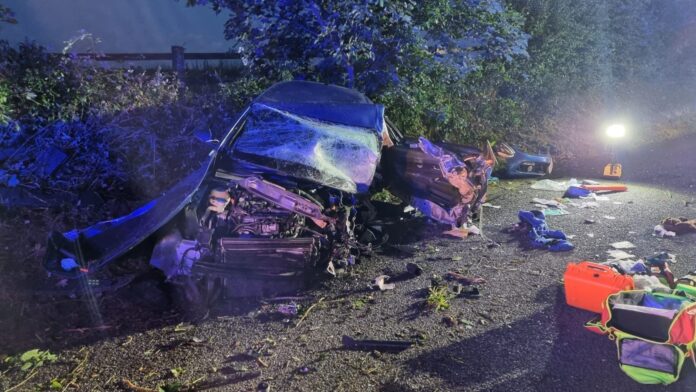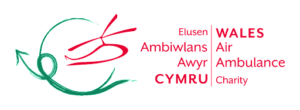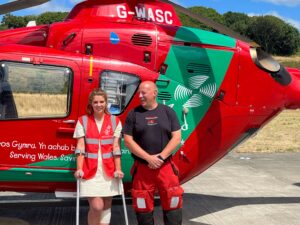In the blink of an eye, Sinead Williams’s life changed forever, but thanks to the Wales Air Ambulance Charity and the Emergency Medical Retrieval Transfer Service (EMRTS), Sinead was reunited with her family.
In August 2021, Sinead was involved in a catastrophic road traffic collision on Swansea Road in Pontlliw in the early hours of the morning. She was a passenger in a car when the driver lost control and crashed into a lamppost.
The driver was lucky to escape with minimal injuries, but Sinead was left fighting for her life.
A 999 call was made and sparked the interest of the EMRTS Critical Care Practitioner working on the Critical Care Hub.
The Critical Care Hub, also known as ‘the desk’ is a vital part of the Wales Air Ambulance and EMRTS service. 24 hours a day, every 999 call is monitored by a critical care practitioner and allocator, to identify where critical care interventions will be required.
Dan Jenkins, the Critical Care Practitioner working on ‘the desk’ that night, said: “It was the early hours of the morning, and I noticed the 999 call for Sinead’s accident. As a high mechanism incident, it sparked my interest, so I spent some time interrogating the call and finding out some more information about the incident.
“From the details I had, it was clear that Sinead was going to need critical care interventions at the scene, so I tasked the Charity’s overnight team from Cardiff, who decided to go by air.
“The team were able to take the emergency department to Sinead, giving her the best possible care and chance of survival.”
The Welsh Ambulance Service arrived on scene first, followed by Wales Air Ambulance.
The crew onboard were Critical Care Consultant Dr Tom Renninson and Critical Care Practitioner Steffan Simpson. Upon arrival, Sinead was unconscious and not breathing.
Dr Tom Rennison, Critical Care Consultant said: “Sinead had a very weak pulse and was very seriously injured, with extensive head, chest and abdominal injuries. We put her in a pelvic binder and had to administer a general anaesthetic and use all the blood products we had with us. She also needed a large central line placed into her veins so that the blood transfusion could be provided rapidly.”
After the anaesthetic was given, the team was able to ventilate her by placing a tube down her throat, which enabled them to take over her breathing. She also required surgical procedures to her chest, to relieve some of the pressure, known as a thoracostomy.
The advanced critical care treatments Sinead received at the roadside would usually only be available within a hospital emergency department setting. Thanks to the unique partnership between the Wales Air Ambulance Charity and EMRTS, Sinead had access to pre-hospital care which ultimately saved her life.
Once stable, the team was ready to transport Sinead to the University Hospital of Wales in Cardiff.
Critical Care Practitioner, Steffan Simpson, said: “Due to the severity of Sinead’s injuries, we decided that it would be best to transport her via road. She had already received the vital treatments she required at scene, and I joined her on the road ambulance to monitor her.
Sinead spent the next three months in hospital and received 140 units of blood. She also underwent nine separate operations.
Sinead said: “I can’t remember much of it but I know how serious my injuries were. I had broken so many bones and had multiple organ failure. I had a brain injury and collapsed lungs – they were blown up at the side of the road by the crew.”
Sinead suffered fractures to her pelvis, thigh, arms, and back, two collapsed lungs, internal bleeding, injuries to her liver, pancreas, and a kidney, and bleeding on the brain.
The EMRTS consultants who work on board the Wales Air Ambulance Charity vehicles also work in hospitals across Wales.
Critical Care Consultant, Dr Chris Hingston, said: “Like all my consultant colleagues working on board Wales Air Ambulance, I also work in the hospital.
“I was the consultant on call when Sinead arrived with us at the University Hospital of Wales, and she was taken straight to theatre. At that point, I really thought she wasn’t going to survive. She was so unwell and remained in a coma for three weeks.
“It was only after three weeks that we were able to start to wake her up and see how her brain was. We still didn’t know whether she was going to recover from a neurological point of view.”
Sinead suffered a stroke which has impaired her mobility but against the odds has continued to thrive.
The air ambulance service in Wales is delivered via a unique Third Sector and Public Sector partnership. The Wales Air Ambulance Charity relies on public donations to raise the £11.2 million required every year to keep the helicopters in the air and rapid response vehicles on the road. The Emergency Medical Retrieval and Transfer Service (EMRTS) supplies highly skilled NHS consultants and critical care practitioners who work on board the Charity’s vehicles.
Help keep news FREE for our readers
Supporting your local community newspaper/online news outlet is crucial now more than ever. If you believe in independent journalism, then consider making a valuable contribution by making a one-time or monthly donation. We operate in rural areas where providing unbiased news can be challenging. Read More About Supporting The West Wales Chronicle

























